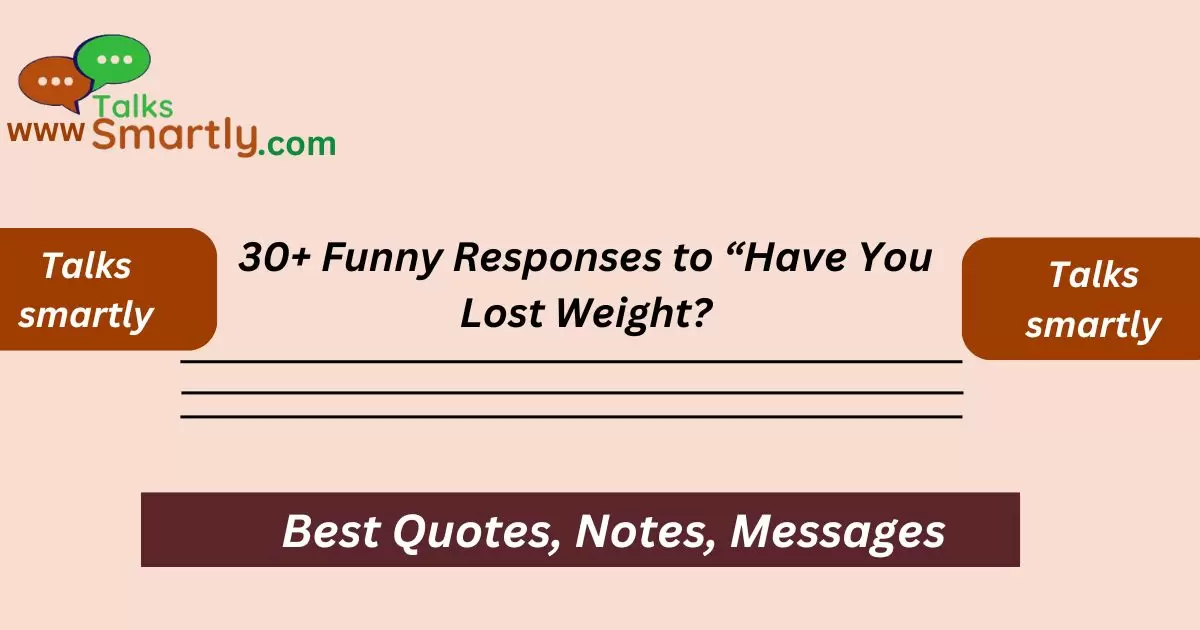Introduction
Navigating questions about weight loss can be tricky, but with these humorous responses, you can turn awkward moments into playful exchanges that entertain and lighten the mood
Addressing questions about weight loss can often be a delicate dance between honesty and diplomacy. Whether the inquiry comes from genuine curiosity or idle conversation, responding with humor can lighten the mood and steer the conversation away from potentially uncomfortable territory.
This article explores creative and humorous responses to the common question, “Have you lost weight?” These responses are crafted to entertain and amuse while gracefully navigating the nuances of body image and personal perception.
Navigating questions about weight can sometimes feel like tiptoeing through a minefield of social expectations and sensitivities. However, with the right blend of wit and tact, these interactions can become opportunities for playful banter and enjoyable exchanges. From clever deflections to whimsical explanations, each response offers a unique perspective on weight loss that aims to entertain without causing offense.
Funny Responses to “Have You Lost Weight?”

- “No, I’ve just been practicing my vanishing act.”
This response humorously suggests that weight loss is akin to performing magic, where the weight seems to disappear mysteriously. It adds a playful tone to the question, implying that weight loss can be as elusive and magical as a vanishing act performed by a magician.
- “Actually, I’ve found it. It was hiding in the last place I looked.”
This comeback flips the question on its head by suggesting that the weight wasn’t lost but rather found. It plays with the idea that weight can hide in unexpected places, adding a humorous twist to the conversation about weight loss.
- “I haven’t lost it; I just redistributed it. It’s all about strategic placement, you know.”
This response humorously suggests that weight hasn’t been lost but rather strategically redistributed to create a more flattering appearance. It jokes about the idea that weight can be managed through clever positioning rather than actual loss.
- “No, just great angles.”
This response humorously attributes the appearance of weight loss to the way someone is seen from different angles. It suggests that the perception of weight loss can be influenced by how one is viewed, playing on the idea that angles can create illusions.
- Nope, just lucky clothing.”
Here, the response humorously suggests that any appearance of weight loss is due to fortunate clothing choices rather than actual loss. It plays with the notion that clothes can sometimes make a person appear slimmer or more toned than they actually are.
- “No, it’s all Photoshop.”
This humorous response jokingly attributes any perceived weight loss to the wonders of digital editing software like Photoshop. It adds a modern twist to the conversation, implying that appearances can be digitally altered, even in real life.
Clever Exaggerations: Weight Loss Humor
- “Yes, I lost it somewhere between the couch cushions, but I’m planning a rescue mission tonight.”
This response humorously exaggerates the concept of losing weight by suggesting it was misplaced like an object between couch cushions. The mention of a “rescue mission” adds a playful element, implying a humorous effort to retrieve the lost weight.
- “Shh, it’s a secret. My weight and I are playing hide and seek.”
Here, the response compares weight loss to a game of hide and seek, where the weight is portrayed as playing a game of concealment. It adds a whimsical touch to the conversation by personifying weight loss in a playful manner.
- “I didn’t lose weight. Gravity just likes me more these days.”
This response humorously suggests that any appearance of weight loss is due to a change in gravity’s affection rather than actual efforts. It adds a humorous twist by attributing changes in weight to external forces rather than personal actions.
For the Love of Food – When Food is More Important Than Weight Loss (Funny Answers)
- “No, but I did lose my chocolate bar. Have you seen it?”
This response humorously deflects from the weight loss question by shifting focus to a missing chocolate bar, implying that food is more important than concerns about weight. It adds a light-hearted touch to the conversation.
- “Yes, I’ve been on a strict diet of laughter and good vibes. Highly recommend it.”
Here, the response humorously suggests that the individual has been focusing on intangible aspects like laughter and positivity rather than weight loss. It promotes a light-hearted approach to health and happiness.
- “I think my appetite just got lost on the way to the fridge.”
This response humorously suggests that any lack of weight gain is due to a misplaced appetite rather than intentional efforts. It adds a playful twist to the conversation about food and weight.
Good Roasts For Fake Friends To Expose Them
Weight Questions? Try these Deeper (and Funny) Responses
- “Weight is just a number, and I’m more of a words person.”
This response humorously dismisses the significance of weight as merely a numerical value. It redirects the conversation away from physical measurements to the realm of language and communication, suggesting a preference for intellectual or verbal pursuits over concerns about weight.
- “I’ve been shedding emotional baggage. Turns out, it weighs a lot more.”
Here, the response uses humor to metaphorically address weight loss as shedding emotional burdens rather than physical weight. It playfully suggests that emotional baggage can be heavier than physical weight, adding depth to the humor by touching on the complexities of human emotions.
- “I’m not sure, but I’ve definitely lost my patience for weight questions.”
This response humorously acknowledges the repetitive and sometimes intrusive nature of weight-related inquiries. It light-heartedly implies that the individual has grown weary of such questions, subtly deflecting while maintaining a humorous tone.
Outlandish and Hilarious Weight Loss Comebacks

- “Only my hair. Decided it was time for it to go on a diet too.”
This response humorously suggests that any perceived weight loss is actually due to a haircut rather than intentional efforts. It adds a playful element by anthropomorphizing hair and attributing changes in appearance to a humorous reason like hair management.
- “Yes, I lost weight… in my dreams. Then I woke up.”
Here, the response humorously suggests that thoughts of weight loss were purely imaginary and not grounded in reality. It adds a whimsical touch by referencing dreams as the source of weight loss, highlighting the disconnect between fantasy and reality.
- “I tried, but it keeps finding me. I guess we’re just meant to be together.”
This response humorously suggests that attempts at weight loss have been unsuccessful because weight always seems to return. It personifies weight as something persistent and inevitable, adding a light-hearted twist by implying a humorous relationship dynamic.
Funny Tech-Inspired Answers about Weight Loss
- “I didn’t lose weight. It’s just the latest software update. Makes me look slimmer.”
This response humorously attributes any perceived weight loss to technological advancements rather than personal efforts. It adds a modern twist to the conversation by referencing software updates and their effects on appearance.
- “Yes, thanks for noticing! I’ve been working out… my thumbs on social media.”
Here, the response humorously suggests that any appearance of weight loss is due to activities like social media engagement rather than physical exercise. It adds a playful element by contrasting digital interaction with traditional forms of fitness.
- “I installed a weight-loss app.”
This response humorously suggests that weight loss has been facilitated by a fictional app, poking fun at the proliferation of health and fitness apps in modern culture.
- “I’m in low-power mode.”
Here, the response humorously suggests that the individual is conserving energy like a device in low-power mode, which may affect their physical appearance.
- “Switched to lighter pixels.”
This response humorously suggests that any perceived weight loss is due to a change in digital imaging technology rather than real-life changes.
- “Using cloud storage for fat.”
Here, the response humorously references cloud computing technology by suggesting that excess weight has been stored digitally rather than physically.
- “Updated to slim version.”
This response humorously suggests that the individual has undergone a digital update that makes them appear slimmer, akin to updating software to a newer, sleeker version.
“Did You Lose Weight?” – Mysterious and Evasive Replies
- That’s classified information. I could tell you, but then…”
This response humorously suggests that weight loss is a confidential matter, adding a playful element of mystery to the conversation. It implies that revealing such information could lead to unforeseen consequences or humorous outcomes.
- “I’ve been experimenting with invisibility. So far, so good.”
Here, the response humorously suggests that any perceived weight loss is actually due to mastering the art of invisibility. It adds a whimsical touch by implying a fantastical explanation for changes in appearance.
- “I didn’t lose weight. I just lost the weight of other people’s opinions.”
This response humorously suggests that any changes in appearance are due to shedding the burden of caring about others’ opinions rather than physical weight loss. It adds a deeper, philosophical twist to the conversation.
- “I’m sworn to secrecy.”
This response humorously suggests that weight-related matters are confidential or sensitive, adding an air of intrigue to the conversation. It implies that there may be humorous or unexpected reasons for keeping such information private.
- “That’s classified information.”
Similar to the previous response, this one humorously suggests that weight-related details are classified or restricted, adding a touch of mystery and humor to the interaction.
- A magician never tells.”
Here, the response humorously compares the question of weight loss to the secrets of a magician, implying that any explanations would spoil the magic. It adds a playful element by framing weight loss as a mysterious and magical phenomenon.
- “The universe works mysteriously.”
This response humorously suggests that changes in weight are governed by mysterious cosmic forces rather than personal effort or circumstance. It adds a whimsical, existential twist to the conversation about weight.
- “You’ll never know!”
This playful response humorously suggests that the answer to the question of weight loss will remain a mystery, adding a sense of intrigue and humor to the conversation.
Witty Comebacks: Slimming Secrets
- “Oh, it’s just sorcery.”
This response humorously suggests that any perceived weight loss is due to magical or mystical means, adding a whimsical and fantastical element to the conversation.
- . “I switched to air diet.”
Here, the response humorously suggests that the individual’s diet now consists of air, poking fun at extreme or unconventional dietary trends in a lighthearted manner.
- “I hired a body double.”
This response humorously suggests that any perceived changes in appearance are actually due to employing a stand-in or look-alike, adding a humorous twist by implying deception or trickery.
- “I shed imaginary pounds.”
Here, the response humorously suggests that any changes in weight are purely imaginary or illusory, playing on the idea of perception versus reality in a playful manner.
- “I paid off the scales.”
This response humorously suggests that any perceived weight loss is due to bribery or manipulation of the weighing scales, adding a humorous touch by implying a financial solution to weight management.
Tips for Nailing Your Funny Weight Loss Comebacks
- Know Your Audience: Understand the context and the person you’re talking to. Ensure they appreciate humor and won’t take offense to playful responses about weight.
- Keep it Light and Playful: The key to funny comebacks is to keep them light-hearted and humorous. Avoid any comments that could be interpreted as hurtful or insensitive.
- Timing is Everything: Deliver your response at the right moment. A well-timed joke can lighten the mood, but make sure it’s appropriate for the situation.
- Use Creative Imagery: Incorporate creative and imaginative elements into your response. Comparisons to magic, technology, or everyday situations can add wit and charm.
- Practice Delivery: Work on your delivery to ensure it’s natural and confident. Practice with friends or in front of a mirror to refine your comedic timing.
- Be Self-Deprecating (if comfortable): Self-deprecating humor can be effective if done tastefully. Lightly poking fun at yourself can make your response more relatable and less offensive.
- Respond with Confidence: Confidence in your delivery can make even a simple joke more effective. Own your response and show that you’re comfortable with the topic.
- Avoid Sensitive Topics: Stay away from jokes that touch on sensitive issues like body image disorders or serious health concerns related to weight.
- Respect Boundaries: If someone seems uncomfortable or reacts negatively to your joke, be ready to gracefully change the subject or apologize if necessary.
- Keep it Short and Sweet: Funny comebacks are most effective when they’re concise and to the point. Avoid long explanations or jokes that might drag on.
Answer to key question
Q1: Are all these responses appropriate for everyone?
Yes, these responses are crafted to be light-hearted and humorous, suitable for casual conversations where the intention is to add humor and deflect from the seriousness of weight-related inquiries.
Q2: I like a few of the funny responses but worry they might sound rude. How can I avoid that?
To avoid sounding rude, it’s essential to deliver these responses with a playful tone and a smile. Context and delivery matter—ensuring the other person knows you’re joking and not being dismissive or offensive.
Q3: What if someone seems genuinely concerned about my weight?

If someone shows genuine concern, it’s best to acknowledge their feelings respectfully. You can thank them for their concern and assure them that you’re managing your health in a way that works for you, whether or not it involves weight loss.
conclusion
In conclusion, responding to questions about weight loss can be both humorous and tactful, adding a touch of wit to what can sometimes be a sensitive topic. By employing clever comebacks that range from playful deflections to imaginative scenarios, individuals can navigate these inquiries with grace and humor.
Throughout this article, we explored various approaches to responding to the question “Have you lost weight?” Each response was crafted to lighten the mood while avoiding any potential discomfort, emphasizing the importance of context, delivery, and knowing your audience.












